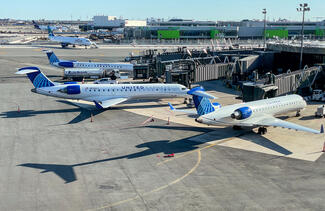United Airlines has recently unveiled more details about its strategy to improve operations at its Newark Liberty International Airport (EWR) hub. The hub experienced a series of flight cancellations in late June due to operational disruptions caused by severe weather.
During the company's Q2 earnings conference call, CEO Scott Kirby stated that the airline is taking unprecedented measures to address the operational challenges at the airport, which persist regardless of weather conditions.
Brett Hart, the airline's president, outlined four key initiatives aimed at enhancing the New York operation. These include:
- Reducing the total number of flights and rescheduling some flights to non-peak hours.
- Opening six new gates in Terminal A.
- Modifying aircraft schedules to allow more aircraft to operate on an "out and back" basis, rather than following a line of flying on a given day, to prevent a domino effect of disruptions across the network.
- Increasing resources in crew scheduling and fast-tracking the implementation of various automated and tech-based tools.
United Airlines is also advocating for a Federal Aviation Administration reauthorization bill that would provide the FAA with the necessary resources, tools, and funding. This is partly in response to an ongoing air traffic controller shortage that has affected the airspace around New York City this summer.
Despite the operational challenges, the airline remains committed to its Newark hub, viewing it as an ideal location for an international gateway. This is due to the local demand in and around the New York City region, as well as the connecting flights from other parts of the country.
The airline's "United Next" plan, which includes operating fewer flights on some short-haul routes but with larger planes, will continue. This approach is expected to maintain or increase the number of passengers, despite the reduction in departures.
During the week of June 24 to July 4, United canceled nearly 3,400 mainline flights, which accounted for 15.7% of those scheduled, according to FlightAware. It also delayed nearly half of its flights, even as competitors managed to recover quickly from the sporadic but intense storms that hit the Northeast during the last weekend of June.


